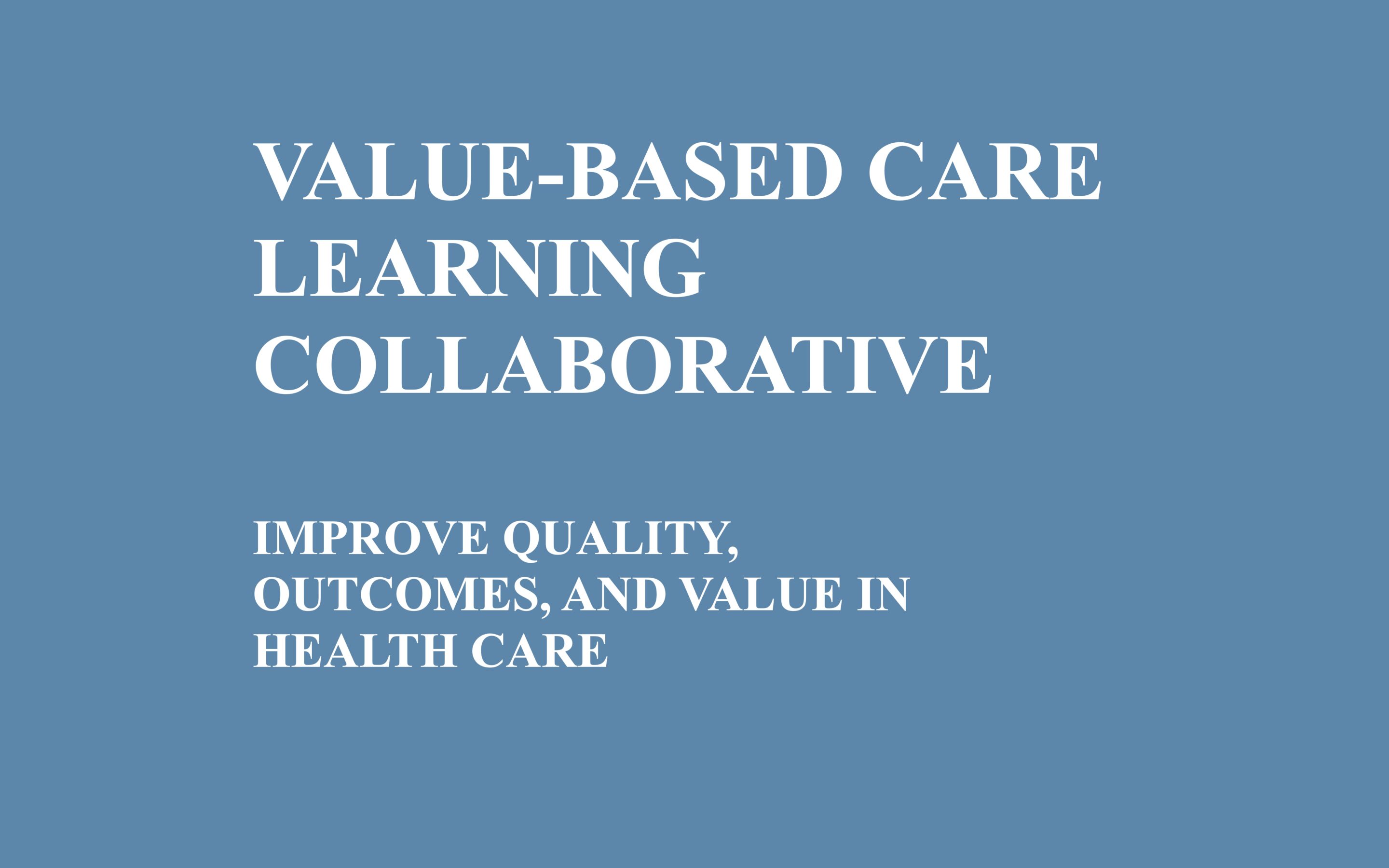


Engaging Families In Primary Care Behavioral Health (PCBH Series Part 12)
PCBH services not only facilitate change at the individual level but impact the family system. Conversely, family engagement in PCBH services can expedite the achievement and sustainability of an individual’s health goals. Strategies will be discussed that can help enhance family engagement within the PCBH model of care.
LGBTQ+ Cultural Competency Training – Part 2
https://www.integratedcaredc.com/wp-content/uploads/2023/06/LGBTQ-Cultural-Competency-Training-Part-2.mp4 Description: Lesbian, gay, bisexual, transgender, and questioning/queer (LGBTQ+) individuals are frequently underserved and experience significant...
Integrated Care DC Managed Care Readiness Workshop
View materials from this event hosted by Department of Health Care Finance, DBH Training Institute, & Integrated Care DC on May 9, 2023. The in-person workshop was designed for behavioral health providers and other organizations seeking to prepare for the integration of behavioral health into the District’s Medicaid Managed Care Program. Presenters shared information and facilitated exercises to help leadership, clinical and operational staff, and other stakeholders develop the organizational competencies needed to succeed in managed care, including an understanding of managed care principles, how to communicate effectively with managed care partners, and how to effectively demonstrate the value of care through quality measurement and population health.
LGBTQ+ Cultural Competency Training Part 1
Lesbian, gay, bisexual, transgender, and questioning/queer (LGBTQ+) individuals are frequently underserved and experience significant disparities in health outcomes and accessing preventive and ongoing healthcare. Sexual and gender minorities (SGM) often experience discrimination and bias in health care settings and may delay or avoid medical and preventive care. Developing safe, culturally competent healthcare environments and practices for LGBTQ+ patients is critical and closely related to individuals’ willingness to openly share their sexual orientation and/or gender identity and expression (SOGIE). Capturing SOGIE data is critical as it allows providers to have a more comprehensive picture of key factors that influence care. This session will start with a brief discussion of SOGIE terminology and a compilation of what is known about medical and behavioral health needs and disparities among the LGBTQ+ community. We will highlight the critical need for creating environments that improve patients’ psychological safety and increase their willingness to share SOGIE characteristics. We will share examples of how this data could be utilized to improve care and patient satisfaction, including capturing a patient’s preferred name and pronouns, and ways to engage in respectful conversations that could reveal key aspects of their medical history that could otherwise go unnoticed.
Dosing and Titrating Care (PCBH Series Part 10)
A core skill in caring for patients in primary care is the ability to dose and titrate care for individual patients in a way that produces quality outcomes for the patient and allows a provider to care for populations of patients effectively. This session will increase the mindfulness and skills clinicians employ for dosing and titrating care from within the PCBH model.Addressing Grief in PCBH (PCBH Series Part 9)
Loss and grief are common and often come up during primary care encounters. Grief can be caused by separations, incapacity, bereavement, migration, job loss, birth, retirement, or professional loss. We will focus on addressing grief related to the loss of a loved one in this webinar. One-third of people affected by loss can experience physical or mental health problems, such as increased risk of heart disease, suicide, psychosomatic disorders, and psychiatric issues. However, loss can also lead to personal growth. Behavioral Health Consultants can help PCPs and patients prepare for grief and build coping skills for better health outcomes.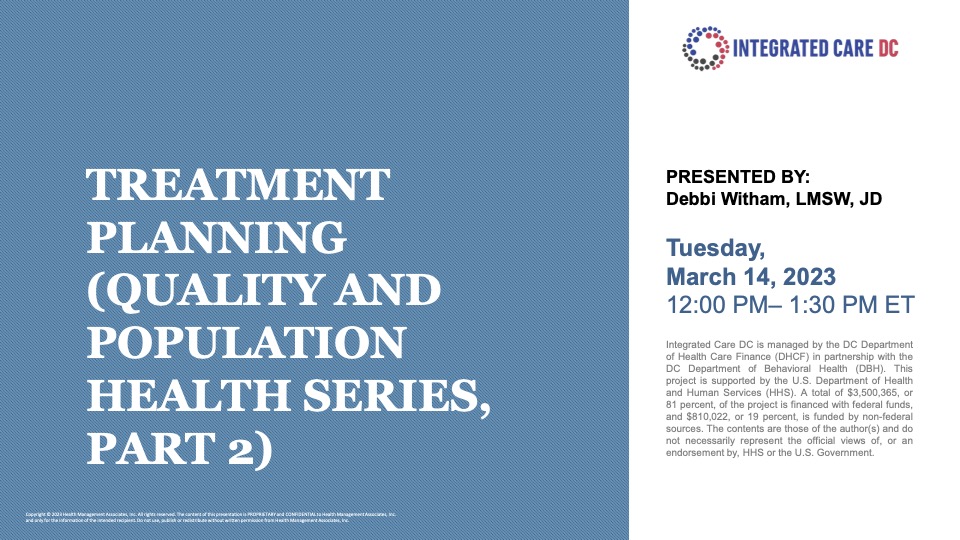
Treatment Planning (Quality & Population Health Series, Part 2)
We often think of the treatment plan as a document to complete. However, it can be a tool to engage and empower the person served in their own recovery process. In this interactive webinar we will learn the core components of the treatment planning process from a person-centered and engagement-focused lens.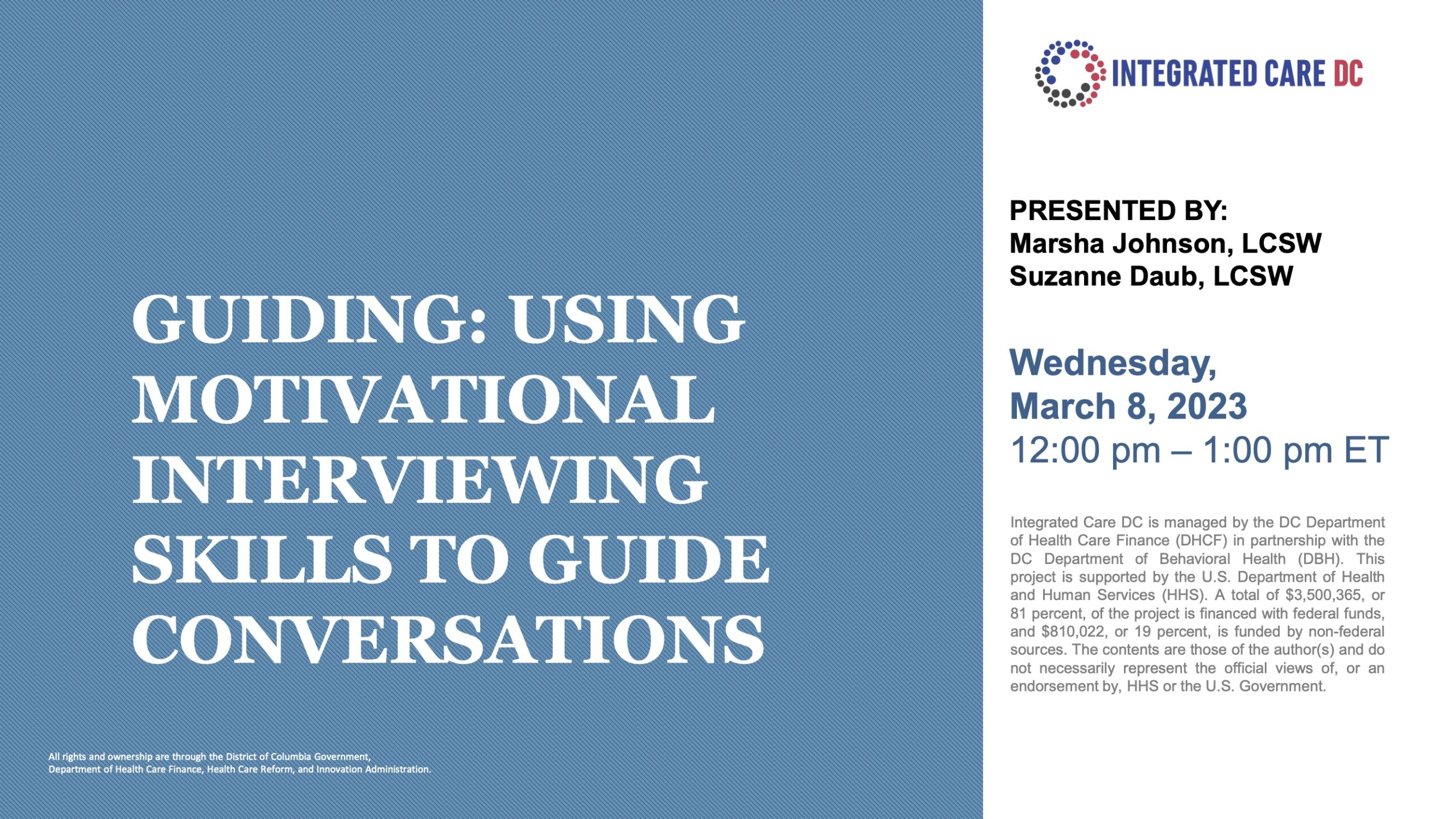
Guiding: Using Motivational Interviewing Skills to Guide Conversations (Motivational Interviewing Series, Part 2)
There are three main approaches to helping people make a change, directing, following, and a middle-of-the-road approach of guiding. Motivational Interviewing (MI) promotes guiding as an approach to discovering and uncovering an individual’s motivations, concerns, values, and options. This refresher workshop will provide the opportunity to directly practice using MI skills to build discrepancy and move conversations towards enhancing commitment to change.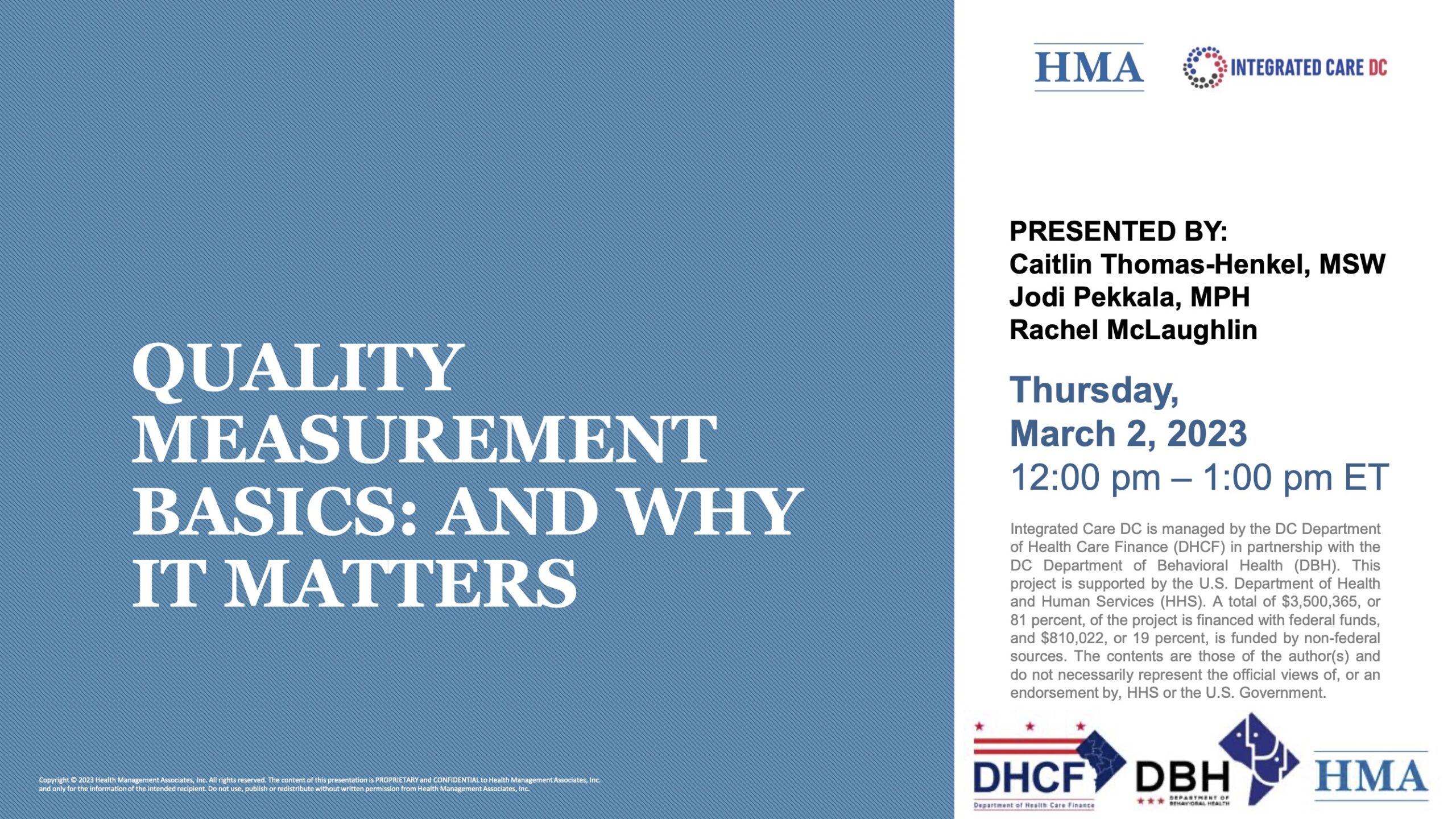
Quality Measurement Basics: And Why it Matters (Quality & Population Health Series, Part 1)
Understanding, measuring, working to improve quality performance are critical to ensuring that patients have positive outcomes and providers are satisfied—they’re also critical to ensure your practice is meeting its regulatory requirements and maximizing payment opportunities. As the District of Columbia carves in behavioral health care to managed care arrangements and requires more providers to be in value-based care arrangements, it is even more imperative that quality measurement and improvement is understood and infused across your organization—from providers, to leaders, to auxiliary staff. This two-part series will describe the quality measurement basics and why it matters, and then treatment planning for population health. In Part 1, we will explore why we need to infuse a culture of quality within healthcare organizations, including an understanding of what we value, who we serve, and who we are accountable to. Presenters will emphasize the importance of all staff understanding quality and its impact on our patients, staff and organization. We will review the basics of measurement and key measures in quality focused on integrated care.Is a 20-minute consultation realistic? (PCBH Series Part 8)
In making the transition from practicing outpatient behavioral health to primary care behavioral health, clinicians often wonder, how can I do my work in 20 minutes, and is it really possible to make a meaningful difference in this amount of time? This training answers this question directly by simulating a 20 minute behavioral health consultation and discussing as a group each stage of the encounter, best practices, and the strengths and challenges that arise.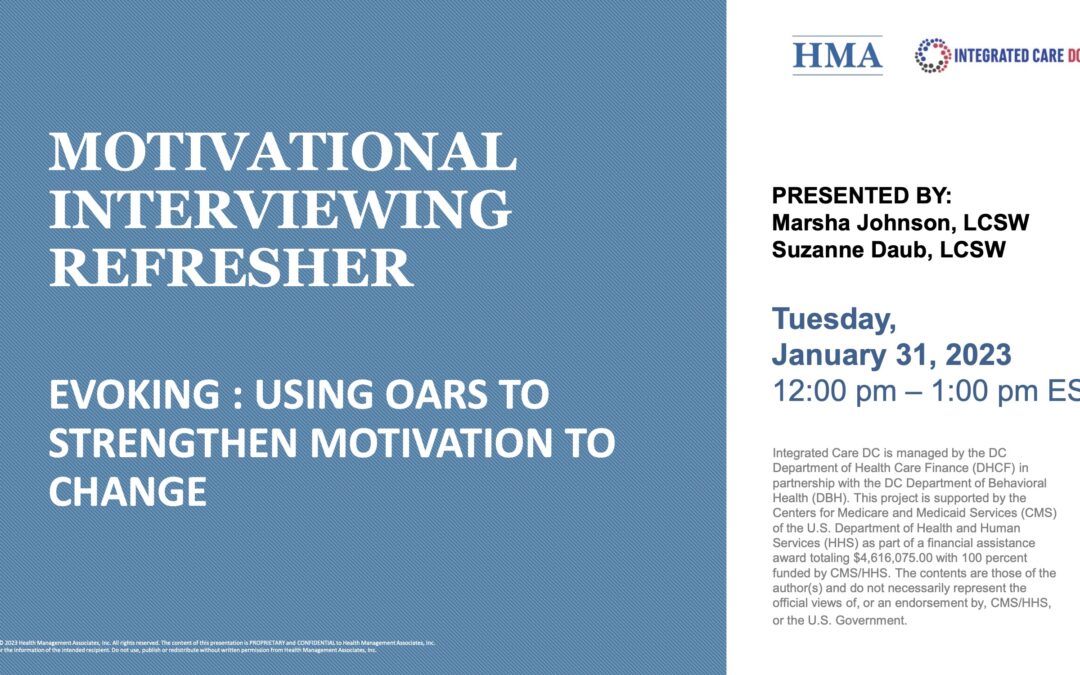
Motivational Interviewing Refresher: Using Open Ended Questions, Affirmations, Reflection & Summarizing (OARS) Skills to Strengthen Motivation to Change (Motivational Interviewing Series, Part 1)
In this first workshop, will spend the majority of the time directly practicing foundational OARS skills to evoke interest and commitment to making health behavior changes.Sustainable Trauma Treatment: How Accelerated Resolution Therapy can be Utilized in a PCBH Setting to Effectively Treat Trauma (PCBH Part 7)
Evidence-based modalities developed to treat trauma are commonplace in outpatient behavioral health practices, but we often struggle to adapt these therapies to the integrated care setting where brief intervention is common. In this session, we will present Accelerated Resolution Therapy (ART) as a useful tool for treating trauma in an integrated setting. Accelerated Resolution Therapy has been shown to achieve benefits rapidly, usually within 1-5 sessions, and is effective in treating PTSD and complex trauma as well as other mental health problems such as anxiety, depression, phobias, grief, chronic pain, and relationship issues. We will explore the basics of Accelerated Resolution Therapy, highlight examples of how it has been used effectively in the primary care setting, and discuss both benefits and barriers to implementing this modality. We will focus on the compatibility of this therapy as a brief intervention within the PCBH model and the particular benefit of sustainability as Accelerated Resolution Therapy reduces exposure to vicarious trauma – critical to clinician self-care and preservation in these trying times.Allowing Data to Tell a Story: Relevant Metrics to Help Reflect the Infinite Values of Integrated Healthcare (PCBH Part 6)
As healthcare centers around the country further embrace data and metrics, integrated primary care behavioral health programs must incorporate data to reflect the value of work being done. In this webinar, attendees will learn about primary data and metric points and the importance of ensuring that data tells a story and reflects the infinite values of health systems, rather than becoming finite goals.Behavioral Health Consultation: Handling Behavioral Health Emergencies in Primary Care (PCBH Part 5)
Managing emergencies is challenging in a high-volume, fast-paced environment. This webinar addresses the ways that BHCs and the primary care team can effectively and efficiently address emergencies.Viewing Time 60 Minutes
It’s a Matter of Context & Compassion: Utilizing Contextualism to Promote Engagement and Health Behavioral Change (PCBH Part 4)
The session will address the realities of health behavioral change and subsequent adherence in integrated, primary care settings, and key lifestyle interventions and recommendations that transcend many evidence-based guidelines for chronic conditions (e.g., diabetes, hypertension, etc.). The session will discuss the importance of filtering evidence-based medicine guidelines through the prism of contextual and compassionate healthcare to increase the probability of patients embracing and implementing such interventions.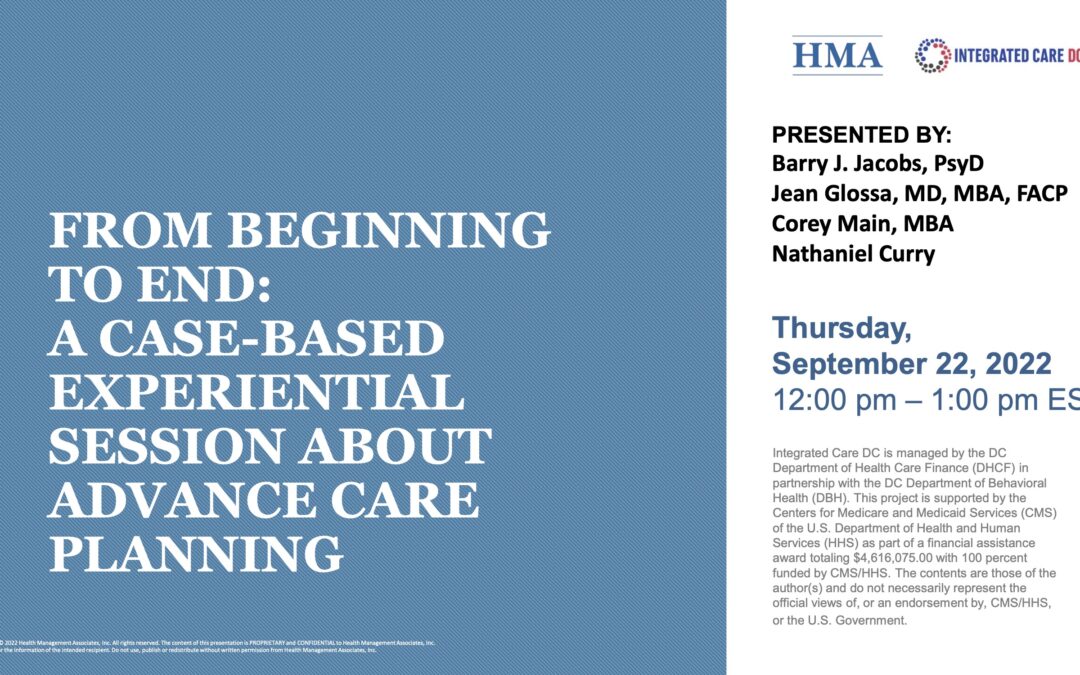
From Beginning to End: A Case-Based Experiential Session About Advance Care Planning (Advance Directive & Person-Centered Care Planning Series 3)
This case-based, hands-on session will allow physical and behavioral health professionals to walk through the steps of engaging patients with different presentations and personalities in Advance Care Planning, codifying their wishes in Advance Directives, and making those Advance Directives accessible on the health information exchange. The session’s experiential design will help providers consolidate their skills, increase their comfort and confidence, and feel inspired to approach patients about Advance Care Planning with new ideas and tools. It will include ad hoc case discussions and time for providers to raise questions and concerns.Making Brief Interventions Radical: Infusing focused Acceptance & Commitment Therapy Integrated Primary Care (PCBH Part 3)
This webinar discusses the concept of functional contextualism and the impact this philosophy has on the therapeutic orientation of focused Acceptance and Commitment Therapy (fACT). Specifically, the session will present fACT concepts such as the Contextual Interview, philosophical underpinnings, and influences of psychological flexibility. The session will also cover the philosophy of functional contextualism/fACT fits well within the Primary Care Behavioral Health philosophy.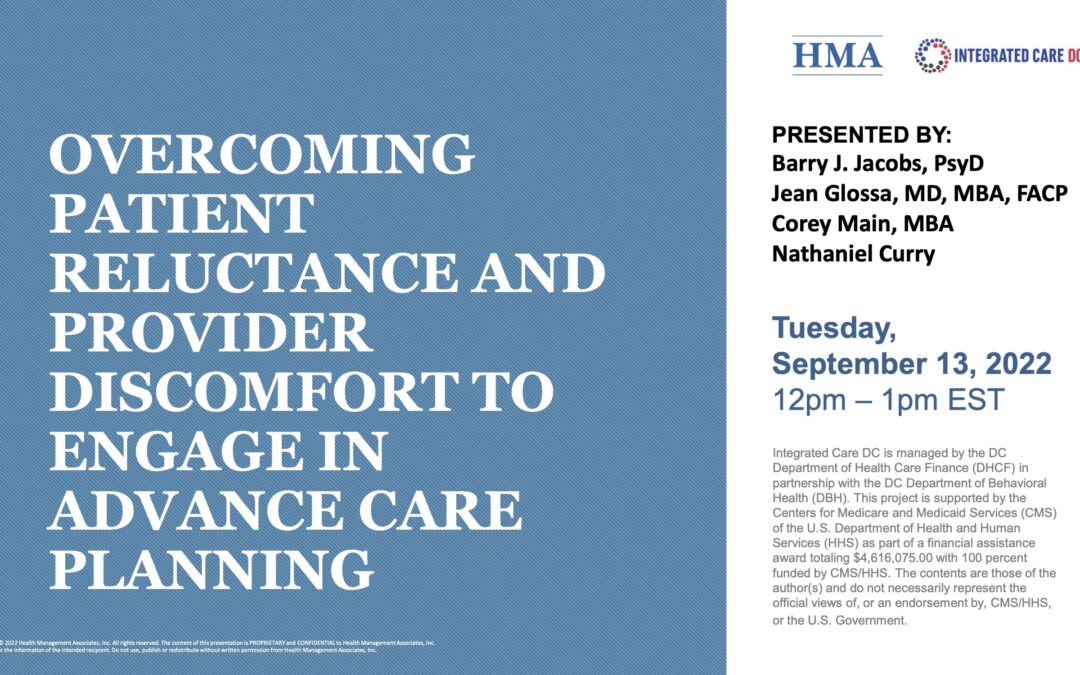
Overcoming Patient Reluctance & Provider Discomfort to Engage in Advance Care Planning (Advance Directive and Person-Centered Care Planning Series 2)
Among the many barriers to Advance Care Planning, patient reluctance and provider discomfort play large roles. In this highly interactive workshop, we’ll discuss concrete behavioral strategies for overcoming the fears that prevent patients from planning for end-of-life care or times when they are incapacitated. Specific topics include employing the spirit of Motivational Interviewing, normalizing doubts, and helping patients understand the benefits for their family members when they decline to plan. The importance of codifying patient wishes and uploading them to health information exchanges through AD Vault will be stressed. Case illustrations will be used throughout.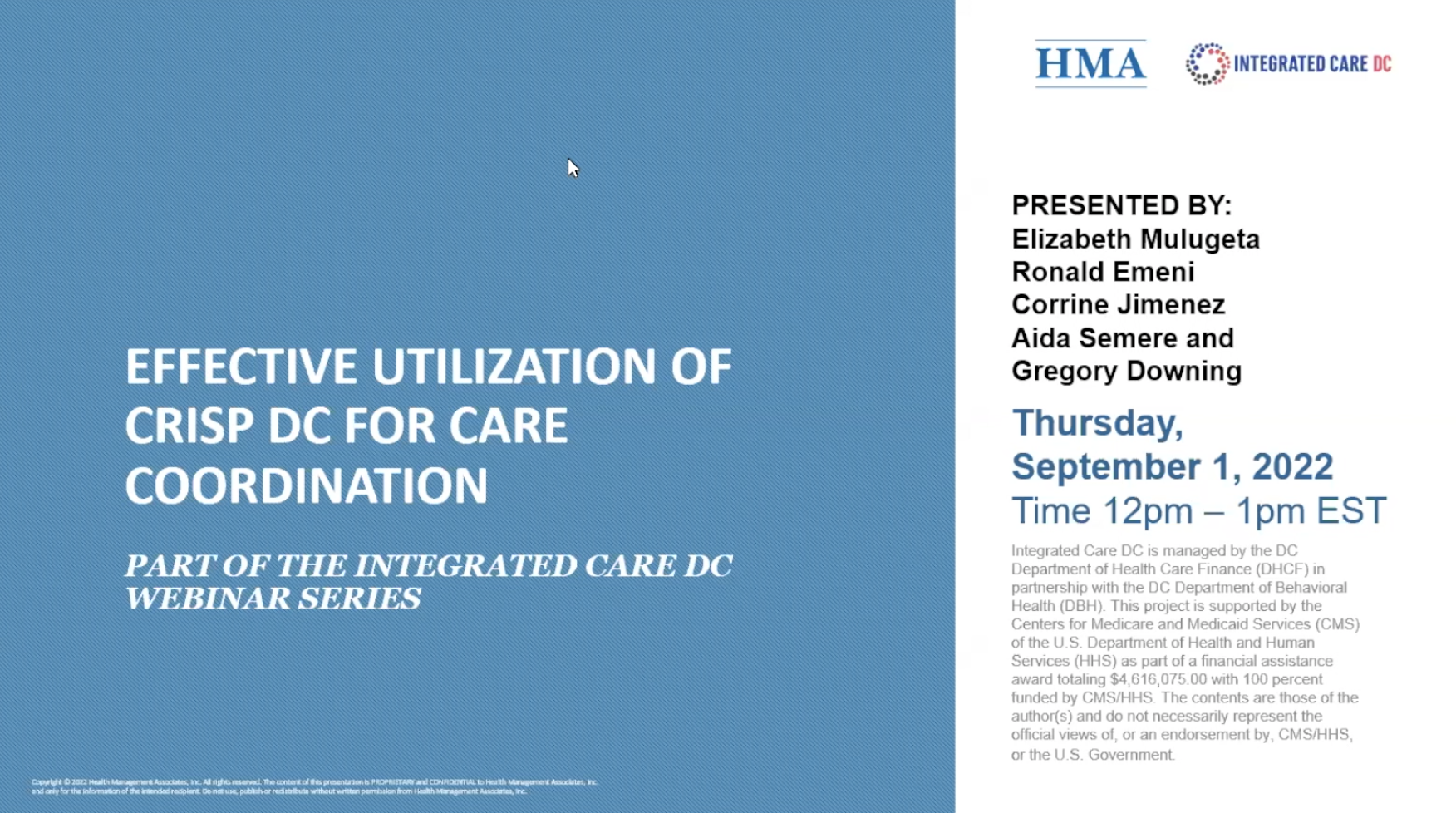
Effective Utilization of CRISP DC For Care Coordination By Outpatient Behavioral Health Providers (DCHA Transitions of Care 2)
Representatives from CRISP DC demonstrated how to use the platform to improve care coordination for patients across the healthcare system.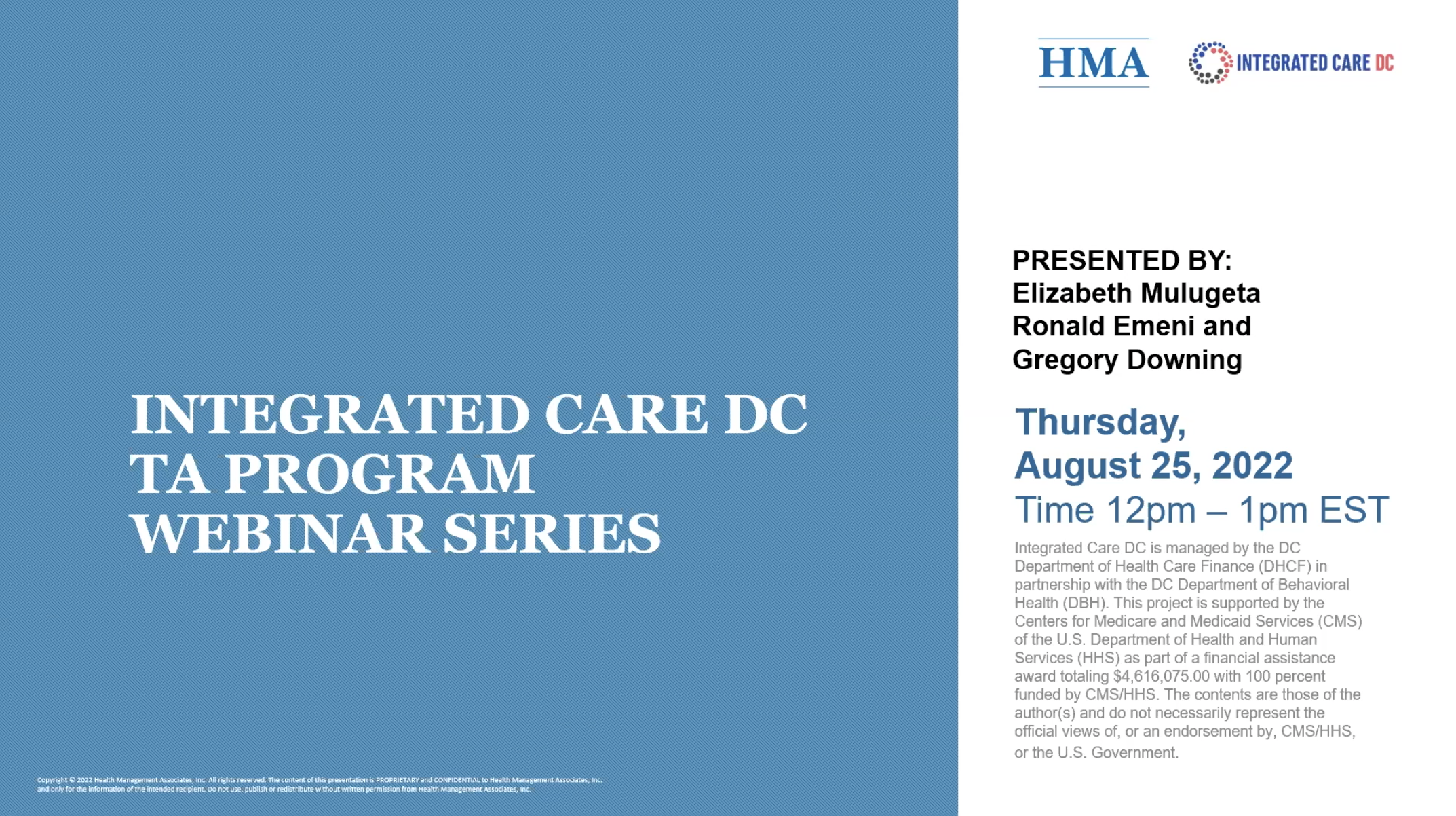
Effective Utilization of CRISP DC for Care Coordination by Hospitals (DCHA Transitions of Care 1)
Representatives from CRISP DC demonstrated how to use the platform to improve care coordination for patients across the healthcare system.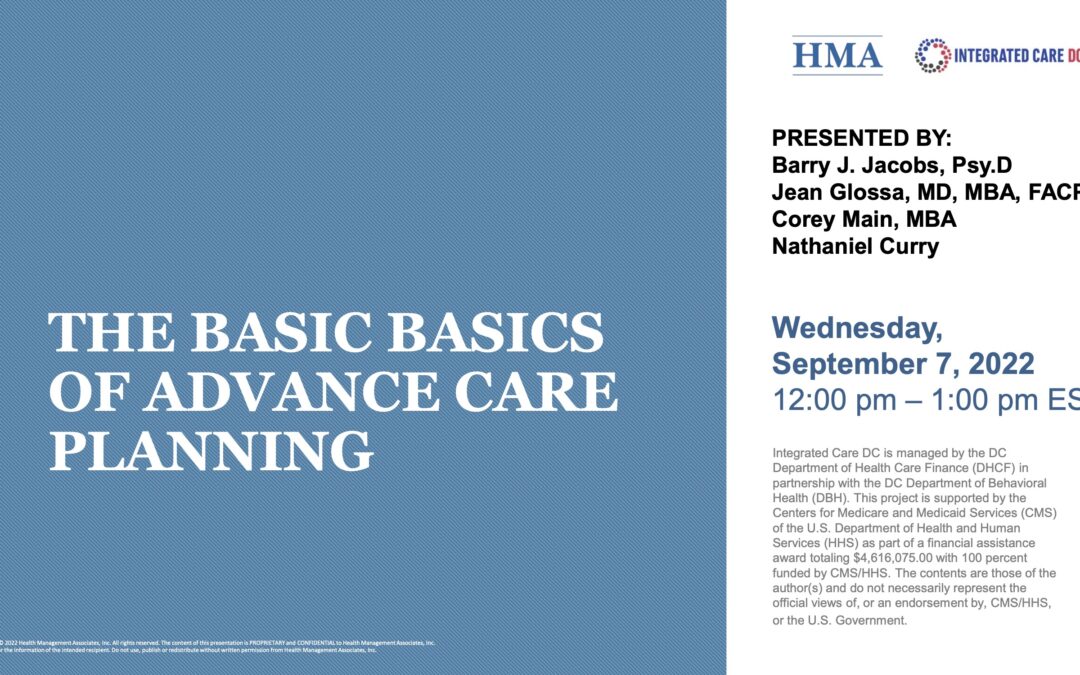
The Basic Basics of Advance Care Planning—What It Is, Why It’s Helpful, & How to Ensure It Matters (Advance Directive and Person-Centered Care Planning Series 1)
This interactive webinar will cover several key topics: clarifying the purpose and processes of Advance Care Planning; its importance for patient self-determination and reducing healthcare costs; providers’ roles as trusted guides in engaging patients in planning; and technological solutions for ensuring Advance Directives are widely downloadable when most needed. CRISP DC’s AD Vault will be introduced. Case illustrations will be used throughout.Consent to Share Substance Use Disorder Information: Office Hours (Consent Management Series 3)
This session will provide an open opportunity for DC Primary Care and Behavioral Health providers, practice administrators, care managers to drop in with questions or technical assistance requests. In this session, we will follow up on any questions or issues raised and unanswered in the first two sessions.Behavioral Health Consultation: Planning with the Patient (PCBH Part 2)
Every behavioral health care visit concludes with a plan that engages patients in active self-management. This webinar covers the steps to creating a collaborative plan with the patient that they can confidently implement between visits.Consent to Share Substance Use Disorder Information: A Provider’s Experience (Consent Management Series 2)
DC-based Medical Home Development Group, which successfully piloted CRISP DC HIE’s consent management tool, will discuss how it used the tool in its workflow and lessons learned. CRISP DC will also join the session to highlight key features and benefits of the consent management tool.Consent to Share Substance Use Disorder Information: The Basics (Consent Management Series 1)
This session will focus on enhancing care coordination for patients with SUD and the importance of gaining permission to release information. We will review scenarios such as: A 35-year-old patient is seeing her PCP. The patient has Type I diabetes and has been much better controlled since she has been in treatment for OUD for the past 5 years. Recently, the patient experienced some life stressors, lapsed and has not been back to treatment for two weeks. A 60-year-old patient has just recently started treatment for co-occurring depression and AUD after discussing treatment for many years with the PCP. He has hypertension and diabetes, and the alcohol use has been exacerbating these conditions for years. The PCP is concerned about the patient’s ability to stay in treatment as the patient has recently lost his job and is separating from his partner of many years. Staying informed of a patient’s recovery status can impact how you treat other health conditions and is an important component of their overall care. Have you hit barriers when trying to get the clinical information you need care for your patient? Are you aware of the new pathway to obtain this information? In this session, we will focus on consent management, how to talk with your patients about consent, the basics of 42 CFR Part 2, myth busting, use cases, and FAQs. We will introduce CRISP DC’s Consent Management tool, including a history of its development, gaps it will address, and key features and why this is a priority in the District.Behavioral Health Consultation: The Structure of the Visit (PCBH Part 1)
This highly interactive webinar will address the structure of the BHC visit from PCP screening for behavioral health conditions and implementing a warm handoff to the steps BHCs take when conducting a rapid and targeted functional assessment.What does it take to create a path towards incentive payment? (Understanding Primary Health Requirements for Incentive Payments Part 2)
A provider will demonstrate how it has decided to use the tools provided by AmeriHealth to start looking at integrated care outcomes. There will be time for audience questions and answers after a brief presentation.Understanding How and Why Providers and Payers are Using Incentive Payments as a Tool to Improve Integration (Understanding Primary Health Requirements for Incentive Payments Part 1)
We will talk with Dr. Yavar Moghimi, Chief Psychiatric Medical Officer of AmeriHealth Caritas about why integrated care is important and the ways AmeriHealth is working with providers to identify and ultimately achieve key physical and behavioral health outcomes. There will be time for audience questions and answers after a brief interview-style presentation.Providers Responsibility in Managing Medical Conditions: Making Clinical Improvements & Meeting Quality Metrics
What’s the link between pay for performance and healthy eating on a budget? What about the link between quality metrics and understanding nutrition labels? These are all related topics that providers and practices address every day! Care teams work 1:1 with patients to better manage their chronic diseases while at the same time, measuring and reporting outcomes that are related to payments and incentives. During this webinar, we will make the connection between patient engagement strategies and meeting quality metrics. This webinar is designed for ALL AUDIENCES as everyone has a role in providing high-quality care- from the exam room to the boardroom. Prior to the webinar, we invite you to view this short video “Bites on a Budget” created by HMA Senior Associate, Brandin Bowden, MSc., as he attempts to build a healthy dinner for under $5. In this #HealthyDinnerChallenge, Brandin puts on his nutrition educator hat to share healthful tips to help your patients and clients navigate the grocery store, increase nutrient intake and promote comfort in the kitchen.The Primary Care Behavioral Health (PCBH) Model of Integrated Care
The Primary Care Behavioral Health Consultation model (PCBH) is a psychological approach to population-based clinical health care that is simultaneously co-located, collaborative, and integrated within the primary care clinic. The goal of PCBH is to improve and promote overall health within the general population. This approach is important because approximately half of all patients in primary care present with psychiatric comorbidities, and 60% of psychiatric illness is treated in primary care. This webinar overs the framework of the PCBH model, the behavioral health consultant role, and a day-in-the-life look at integrated care using this model.Perinatal Substance Use: Everything You Wanted to Know
Because many women and persons of childbearing age pregnant with SUD may not readily share information with providers and because pregnancy is a period where the motivation for change is extremely high, positioning providers to identify and care for this population has great potential for establishing a recovery path and changing lives. This webinar will review the risks and effects of SUD among women of childbearing age, pregnant and parenting persons and their affected infants, including screening and treatment considerations, breastfeeding decisions and ideal mechanisms for engagement and support of women and other pregnant persons on their recovery journey. We will also cover the short and long-term effects of SUD exposure on the infants, including non-pharmacologic alternative interventions and follow-up considerations.Short Take: A Day in the Life of a Behavioral Health Consultant in Primary Care: PCBH Workflow
The Primary Care Behavioral Health Consultation model (PCBH) is a psychological approach to population-based clinical health care that is simultaneously co-located, collaborative, and integrated within the primary care clinic. The goal of PCBH is to improve and promote overall health within the general population. This short take is part of a series titled: A Day in the Life of a Behavioral Health Consultant (BHC) in Primary Care. Viewers will see example workflows for initial and follow up BHC visits including where referrals come from, the steps involved with BHC intervention and closing the loop with the primary care provider.Integrating Screening for Drug Use in General Medical Settings
Universal screening is key to successful detection of who needs further assessment. Additionally most providers are unaware of the power a brie intervention can have or that what they may already be doing with their patients has an evidence base to support it. This webinar will review the difference between screening and assessment and will demonstrate screening, brief intervention and referral to treatment , referred to as SBIRT. We will also review the evidence base for SBIRT and talk to a DC provider who has implemented training on SBIRT in their clinic.Cooking Healthy Meals at Home
Help your patients navigate the barriers to healthy home cooking such as time, comfort, cost, and navigating the Supermarket.Building the Foundation of a Healthy Diet
Share these foundational tips to help your patients think about ways to incorporate more healthy foods into their diets.Start With One Thing
Help your patient's identify goals and create a plan to shift their eating habits.Building a Healthier Plate
Help your patients take charge of their health by becoming more aware of their relationship with the food.Bites on a Budget
Tag along with HMA Senior Associate, Brandin Bowden, MSc., as he attempts to build a healthy dinner for under $5. In this #HealthyDinnerChallenge, Brandin puts on his nutrition educator hat to share healthful tips to help your patients and clients navigate the grocery store, increase nutrient intake and promote comfort in the kitchen. This video was originally shared at the Johns Hopkins Urban Health Institute's 2021 Social Determinants of Health Symposium.MAT and Tele MAT Pre Appointment Self Assessment
This one-page self-assessment can be utilized before individual or group MAT appointments; this tool aligns with ASAM criteria allowing the provider to plan for the current session and to aid in treatment planning. With a slight modification, this could also be used by persons not on MAT in preparation for individual or group appointments for substance use disorders. Critical questions required for all telehealth appointments are reviewed, such as the address and phone number where the person can be reached today.Virtual Best Practices for Providers and Care Team Members
The front of this handout reviews what providers need to know, do and have a plan for prior to individual or group telehealth sessions. The back of the handout reviews important features of Zoom (TM) for those staff using Zoom (TM) as a platform for delivering telehealth sessions.Patient Guide to Starting Buprenorphine
This one-page handout will help patients understand when they will start buprenorphine, based on the last time they used opioids and their current level of symptoms. It describes how to take buprenorphine in order for it to help with cravings and withdrawal symptoms, what dose of medication to take when starting and afterwards, and other important information about buprenorphine.Integration During Pregnancy-With an emphasis on Pregnant People Who Are Using Drugs
This short take talks about the added importance of building trust and integrating culturally and linguistically evidence-informed social, physical and behavioral health services during pregnancy. The short take place particular emphasis on pregnant people who use drugs because historically stigma, racism and other isms have often meant their care has not been clinically appropriate.Clinical Guidance for Treating Pregnant & Parenting Women With Opioid Use Disorder & Their Infants
This Clinical Guide provides comprehensive, national guidance for optimal management of pregnant and parenting women with opioid use disorder and their infants. The Clinical Guide helps healthcare professionals and patients determine the most clinically appropriate action for a particular situation and informs individualized treatment decisions.Deepening Therapeutic Engagement in the Virtual Space
This hour-long presentation will briefly review the empirical evidence on the appropriate use of telebehavioral health and the clinical approaches that have been demonstrated to be effective and/or ineffective. The majority of the presentation will cover the clinical strategies for preparing the clinician for the telehealth visit, including assuring safety, anticipating problems, and engaging the member effectively when on the phone and when on video.
Strategies for Consumer Engagement in Telehealth
This session focuses on patient engagement using telehealth kiosks; learning and discussing applications to your practice. The session was held live during Telehealth in a Post-Pandemic Era: Sustainable Approaches to Support Integrated Care – Part 2, held on September 29, 2021.Problem Solving Treatment & Tools
Problem Solving Therapy (PST) provides tools to help individuals identify and solve problems that can have a negative impact on their day-to-day lives. PST improves an individual's overall quality of life, treats depression and other conditions. It is based on a model that considers the importance of real-life problem-solving, including managing life stressors when they arise. This short take video covers the fundamental principles of PST and the tools to use in everyday life.
